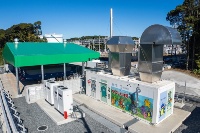Toho and JERA (Chuo Ward, Tokyo) are working to reduce CO2 emissions at Toho Studios, a film studio in Setagaya Ward, Tokyo. On November 29, JERA announced that it has begun supplying hydrogen-generated electricity to Toho Studios through its subsidiary JERA Cross (Chuo Ward, Tokyo).
The hydrogen power generation equipment was delivered by Yanmar Energy Systems (Osaka City) and installed on the premises of the Sodegaura Thermal Power Plant in Sodegaura City, Chiba Prefecture. The equipment is comprised of a hydrogen-only gas engine (output 320kW x 1 unit) manufactured by 2G of Germany, fuel cells (output 35kW x 2 units) manufactured by Yanmar Energy Systems, and hydrogen receiving and supply equipment (capacity 3000Nm3 x 4 units).
The hydrogen fuel will be supplied as industrial hydrogen gas produced at the Sodegaura plant of Air Water Green Design (Minato Ward, Tokyo), a wholly owned subsidiary of Air Water that manufactures and sells carbon dioxide and hydrogen gas. As this will be fossil-derived grey hydrogen and there will be no offsetting of its environmental value, CO2 is currently emitted during hydrogen production.
Additionally, since June, Toho Studios has been receiving electricity from a solar power plant (total output 1380kW) installed by JERA in the Tokyo area. It is estimated that the combined hydrogen and solar power generation will be able to cover around 60-70% of Toho Studios' annual electricity usage. It is expected that hydrogen power generation will be used primarily at night, while solar power generation will be used during the day.
Toho and JERA will work to reduce CO2 emissions through the gradual introduction of carbon-free electricity, ultimately aiming to achieve "24/7 carbon-free electricity" by around 2030.








